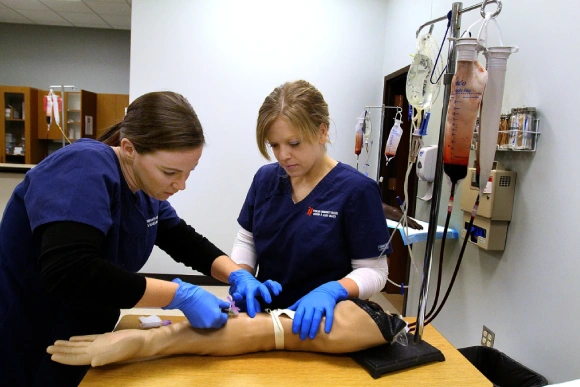In this blog post, we’ll dive into what administrative medical assistants do and discuss why their role is crucial in healthcare. Additionally, we’ll talk about what you need to become one and how to start a career in this field. Finally, we’ll explore the job opportunities you can expect.
What does an administrative medical assistant do?
Administrative medical assistants are crucial in keeping medical offices and clinics running smoothly by handling various tasks. Here are some of the essential things they do:
Scheduling appointments: They handle the calendar, ensuring patients have the fitting appointments at the right times. If plans change, they also take care of rescheduling or canceling appointments.
Greeting and checking in patients: When patients arrive, they are the first faces they see. They check patient details, and help with checking in. They might also get insurance info and answer basic questions.
Maintaining medical records: They look after patient records. This means putting the correct info into electronic health records and updating records when needed. They also ensure all the paperwork is complete and well-organized.
Handling billing and insurance claims: They help with billing and insurance stuff. This includes checking insurance, sending claims to insurance companies, and checking on unpaid claims. They also help patients understand their insurance and payment choices.
Managing correspondence: They deal with messages for healthcare providers. This includes answering calls, responding to emails, and sorting out mail. They have to keep their private info private and act professionally.
Assisting with office management: They also help with general office tasks besides their primary jobs. This can mean ordering supplies and ensuring equipment works well. They also work with other departments or places.
Recommended for you
-
Medical Assistant Program
Take our accelerated Medical Assistant with Clinical Labs program at our Arlington campus and start a new career in as little as 8 months!
Radiology Technician Training
Take our accelerated Radiology Technician Training program at our Arlington campus and start a new career in as little as 8 months!
Medical Billing And Coding Specialist Program
Our 100% online accelerated Medical Billing and Coding Specialist Program makes it possible for you to train for a new career in as little as 25 weeks!
Pharmacy Technician Training Program
Our 100% online accelerated Pharmacy Technician Training program makes it possible for you to train for a new career in as little as 25 weeks!
Medical Assistant Program
Our 100% online fast track Medical Assistant program makes it possible for you to train for a new career in as little as 6 months!
Why is an administrative medical assistant important in the healthcare industry?
The role of an administrative medical assistant is crucial. They ensure the smooth operation of healthcare facilities. Here are a few reasons why they are essential:
Efficiency: Administrative medical assistants help make things run smoothly in the office. This lets healthcare providers focus more on taking care of patients. They make sure everything works well in healthcare places. They handle appointments, keep records, and deal with billing and insurance,
Patient experience: Administrative medical assistants are usually the first people patients meet. How they act, being professional and friendly, and handling tasks well make a good impression on patients.
Accuracy and organization: Keeping medical records accurate and organized is vital in healthcare. Administrative medical assistants ensure all patient information is written down correctly and easy to find.
Compliance: Healthcare places have to follow the rules and guidelines. Administrative medical assistants help by making sure patient information is correct. They follow the proper billing and coding steps. They also keep things private and confidential.
What are the requirements to become one?
To become an administrative medical assistant, certain requirements must be met. However, specific requirements may vary depending on the state and employer. Here are some standard requirements:
Education: You usually need a high school diploma or equivalent. Some places prefer it if you’ve had formal training in medical assisting or a related area.
Certification: It’s not always a must. Although, having certification as an administrative medical assistant can make it easier to find a job. The American Association of Medical Assistants (AAMA) and the National Healthcareer Association (NHA) offer certification programs.
Skills: You need strong organizational, communication, and people skills. You need them to be good at this kind of job. Paying attention to details, being good with computers, and doing multiple things simultaneously are also important.
Experience: You might not need experience for starting roles. However, if you’ve worked in healthcare or an office before, that can be helpful.
How do you become an administrative medical assistant?
If you’re interested in pursuing a career as an administrative medical assistant, here are the steps to take:
Research: Begin by looking into what administrative medical assistants do. This is to ensure it’s something you’re interested in and fits your goals.
Education: If you still need to finish high school, get your diploma or an equivalent. Consider joining a medical assisting program at a vocational school, community college, or online to learn what you need.
Gain experience: Try to get experience in healthcare or offices. You can volunteer, do internships, or work part-time.
Obtain certification: It’s only sometimes needed. However, having a certificate can make it easier to find a job. Find a good certification program that matches your career goals.
Apply for jobs: Start applying for jobs. Update your resume and highlight your skills and qualifications for the job.
Prepare for interviews: Practice answering common interview questions. Have examples ready to show how your skills and experience fit the role. Dress nicely and be prepared to show professionalism and how well you can work with people.
Continuing education: Keep learning about the latest trends and rules in the field. Take more classes or workshops. Do this to show you’re committed to growing professionally. This can open up more job opportunities.
Job outlook
The job outlook for administrative medical assistants is expected to increase. With a projected growth rate of 19% from 2019 to 2029, it’s much faster than the average for all occupations. This is due to factors such as an aging population, expanding healthcare services, and the need for efficient administrative support in medical offices and clinics.
Final Thoughts
Administrative medical assistants play a significant role in healthcare. They handle administrative tasks and support healthcare providers. Their skills in organization, attention to detail, and managing different responsibilities help medical offices and clinics work well.
If you’re interested in being an administrative medical assistant, check out the training programs at CCI Training Center. They offer thorough training that can give you the knowledge and skills you need to do well in this field. Start your journey towards a rewarding healthcare career today!
Martin Zandi

Related Articles















